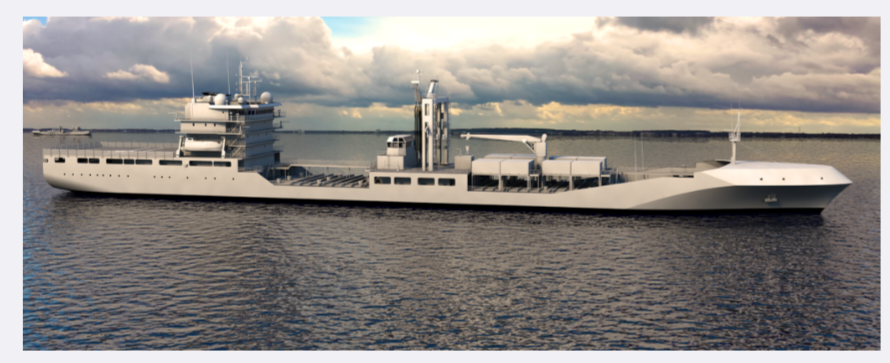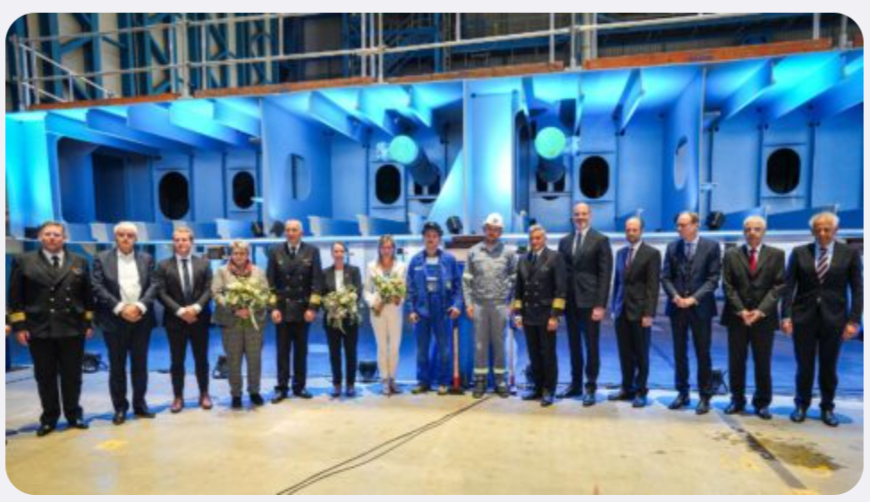German State Secretary for Defense Siemtje Möller (in white, next to the shipyard worker in overalls) traveled to Rostock for the keel-laying of the first of two new fleet tankers for the German navy. It is scheduled to be delivered during the first quarter of 2025. (Bundeswehr photo)
August 15, 2023. BERLIN. The German Navy will get two new tankers in the near future. They will replace the outdated ships “Rhön” and “Spessart”, which have been in service since 1977. More than 900 million euros are being invested. Parliamentary State Secretary Siemtje Möller also attended the keel-laying ceremony at the Neptun shipyard in Rostock.
A major procurement project by the Bundeswehr is taking shape. On August 8, construction of the first of two new Navy tankers began at the Neptun shipyard. The presence of Parliamentary State Secretary Siemtje Möller showed how important the project is for the Ministry of Defense. Möller had come from Berlin for the keel-laying and watched the assembly of the first parts of the ship’s hull.
Each of the new tankers can take around 12 million liters of fuel on board and at the same time refuel up to two warships at sea with marine diesel. The two so-called Class 707 marine tankers are intended to replace the outdated Class 704 tankers, which have been in service with the German Navy for more than 45 years.
The environment is also protected
Due to their age, the operational capability of the ships “Rhön” and “Spessart” can no longer be guaranteed reliably and at a reasonable cost. In addition, the new tankers meet modern environmental standards: they have double outer hulls that prevent the ship’s diesel from leaking out of the tank farms on board in the event of an accident. Thanks to a modern exhaust system, the ships also emit fewer pollutants than their predecessors.

A computer-generated image of the German navy’s future Class 707 fleet tanker whose construction began in Rostock last week. It is due to enter service in 2025. (Bundeswehr image).
The two 173-meter long tankers cost around 914 million euros – including spare parts, special tools and training. The company Lürssen Naval Vessels was commissioned, and in turn brought the Meyer Werft Group on board as a subcontractor. The first class 707 tanker is scheduled to be delivered to the Navy in the first quarter of 2025, and the second one a year later in the first quarter of 2026.
Five years from order to delivery
The budget committee of the Bundestag approved the procurement project in June 2021. The old class 704 tankers will reach the planned end of their service life in August 2026, i.e. a few months after the delivery of their successors. Then they were in operation for almost 50 years.
The new tankers are also to be used for several decades. With its procurement, the Bundeswehr is also fulfilling an obligation to NATO: Germany has assured the alliance that it will provide two ships with the ability to supply fuel at sea until 2040.
In a significant development for the German Navy, the replacement of outdated vessels has been set in motion with the construction of two new tankers. The aging ships, named “Rhön” and “Spessart,” which have dutifully served since 1977, will soon make way for these state-of-the-art replacements. With an investment exceeding 900 million euros, this endeavor underscores Germany’s commitment to enhancing its naval capabilities. The ceremonial keel-laying event, held at the Neptun shipyard in Rostock, was graced by the presence of Parliamentary State Secretary Siemtje Möller. The initiation of construction for the first of the two tankers on August 8 demonstrated the Ministry of Defense’s steadfast dedication to the project. Möller’s attendance highlights the project’s significance in the realm of defense.
These forthcoming vessels, known as Class 707 marine tankers, boast impressive capabilities. Each tanker is capable of accommodating approximately 12 million liters of fuel, while simultaneously supporting the refueling of up to two warships at sea with marine diesel. This cutting-edge capability positions them to replace the outdated Class 704 tankers, which have faithfully served the German Navy for over 45 years. These new tankers prioritize environmental responsibility. The need for retirement of “Rhön” and “Spessart” arises from the fact that their operational reliability has diminished with age. Additionally, modern environmental standards are met by these new vessels through the integration of double outer hulls, preventing diesel leaks in case of accidents. Advanced exhaust systems further ensure a reduction in emissions, aligning with contemporary environmental norms.

